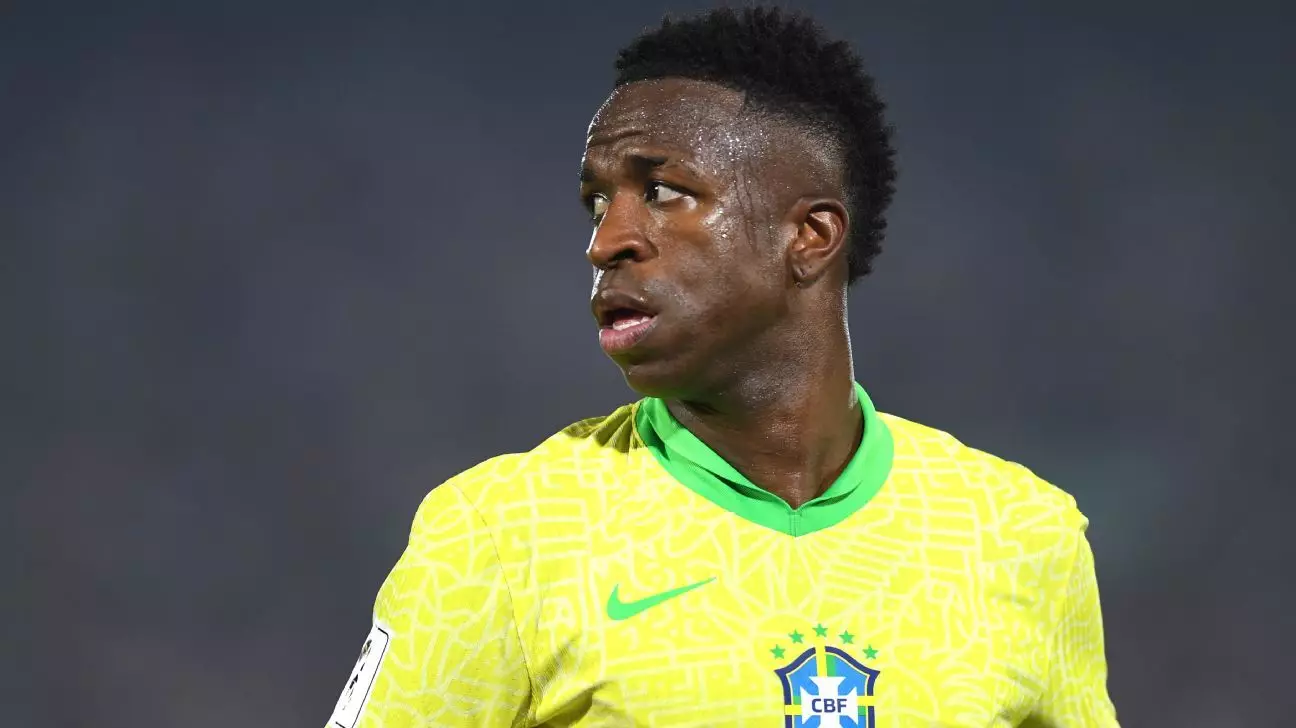The Brazilian national soccer team faced a staggering setback in their recent World Cup qualifier against Argentina, suffering a 4-1 defeat that has reverberated through the heart of Brazilian soccer. Despite Argentina’s star player Lionel Messi being sidelined by injury, the Brazilian squad delivered a disappointing performance, managing only a single shot on target throughout the match. This defeat not only exemplifies the chasm between Brazil and their South American rival but raises serious concerns about the current state of the country’s soccer ambitions.
Vinícius Júnior articulated the sentiments echoing within the team: “Everyone did badly.” Such a stark admission reflects the internal crisis Brazil is facing as they grapple with mounting expectations from fans and stakeholders alike. As the World Cup looms just a year away, Vinícius emphasizes the need for a comprehensive reevaluation of strategies, fostering a sense of urgency that was glaringly absent during the match.
The Pressure to Perform
With the atmosphere charged by a passionate crowd, Brazil’s players felt the weight of their nation’s expectations, and their inability to perform at even a basic level invites scrutiny. “We have to rethink everything we’ve been doing,” Vinícius stated, highlighting a critical juncture for Brazilian soccer. The pressure is now on to create a cohesive unit that not only competes with but also overcomes the best teams in the world.
Brazil currently finds itself in a precarious position, sitting fourth in the South American qualifying group, a full ten points behind leaders Argentina, who have already secured their spot in the next World Cup. The gravity of this gap cannot be understated; Brazil must find a way to restore confidence, not only among players but also among the devoted fans who have long regarded the national team as a symbol of pride.
The Road to Recovery: A Long Journey
Vinícius acknowledges the successful collaborative spirit that Argentina has cultivated over the years, attributing their recent dominance to extended periods of playing together. This element of synergy cannot be overlooked. It begs the question: Is the Brazilian team capable of forming similar bonds in the limited time before the World Cup? They must not only find their rhythm but build an identity that resonates with supporters.
The defeat prompts an urgent dialog about Brazil’s evolution. What can be taken from past qualifiers, and how can those lessons inform future performances? Vinícius insists that while losses are painful, they must serve as learning experiences. “We have to improve, keep our heads up,” he insisted, embodying the resilience that has long defined Brazilian soccer. The roadmap to success will require a meticulous approach, drawing on both past successes and recent challenges.
Strategic Leadership and Future Prospects
The responsibility for the team’s struggles lands squarely on the shoulders of head coach Dorival Júnior, who voiced his commitment to turning the situation around, despite the improbability of immediate results. His open acknowledgment of the shortcomings against Argentina signifies a refreshing transparency. “The responsibility is entirely mine,” he admitted, showcasing humility yet also determination.
Yet the question remains: will the Brazilian Football Confederation (CBF) continue to support Dorival amid these challenges? With reports surfacing about Carlo Ancelotti being a potential successor, it raises the stakes. Ancelotti represents a proven tactical mind, but hiring him would require a delicate negotiation given his commitment to Real Madrid until 2026.
Fan Sentiment and the Buzz of Rivalry
As the match unfolded, the rivalry between Brazil and Argentina intensified, further fueled by pre-match provocations. Raphinha, one of Brazil’s key players, had dubbed the game as an opportunity for revenge, only for his words to backfire spectacularly. Argentina’s Julián Álvarez and goalkeeper Emiliano “Dibu” Martínez both acknowledged that such comments gave them fuel for their passionate performance. The weight of Chutzpah in soccer can often sway momentum, and this illustrates that the battle isn’t won solely on the pitch; it often unfolds in the lead-up as well.
Overall, Brazilian soccer stands at a crossroads. Past achievements cannot mask present deficiencies, and while hopes for success still burn brightly among fans, the reality of their current form must spur a transformative approach. As the team prepares for their next qualifiers against Ecuador and Paraguay, the call to reforge their identity and strategy may well be the catalyst they desperately need to turn the tide. It’s a complex challenge that requires collaboration, creativity, and above all, an unwavering resolve. This is not merely about winning matches; it’s about reigniting the spirit of Brazilian soccer and forging a path toward glory once more.

